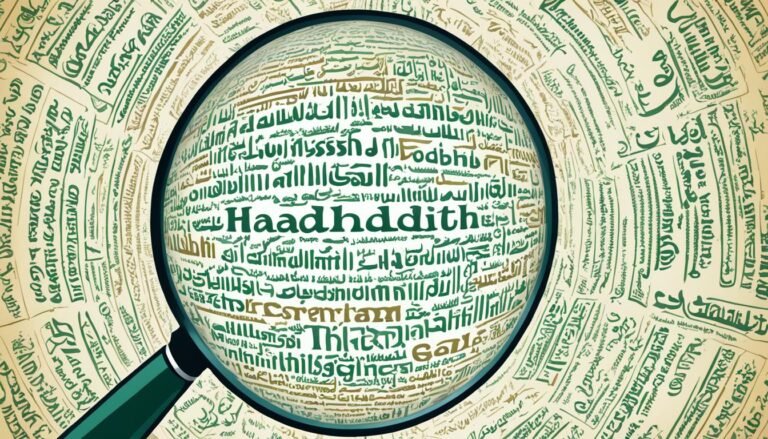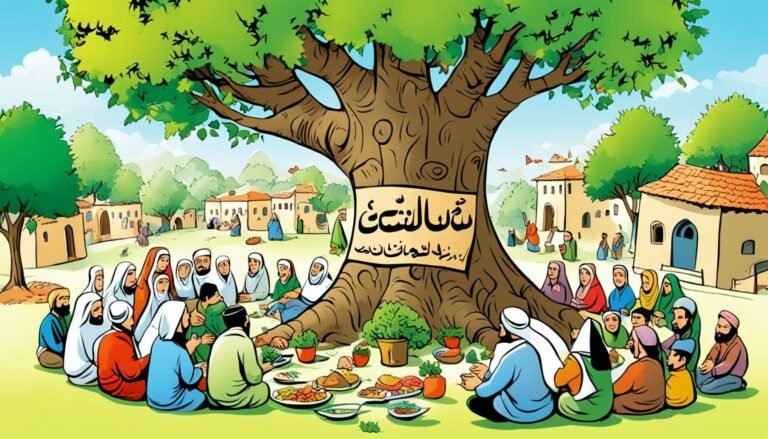Digital Islam: How Technology is Shaping Faith Practices
Today, faith is changing with the digital world. Digital Islam shows how tech meets Islamic practices, offering new ways to connect spiritually. Online, Muslims worldwide are changing how they practice their faith. They use technology to learn and build communities like never before.
This look at tech’s effect on religion shows how it’s changing Islamic practices. It also highlights the growth of digital communities. Scholars and believers share their views on how digital Islam is evolving. They talk about the good and bad sides of adapting faith to the internet.
Key Takeaways
- The rise of digital platforms is transforming traditional Islamic practices into interactive experiences.
- Access to information and resources in cyberspace enhances community building among Muslims.
- Islamic tech evolution enables a diverse range of voices, including scholars, activists, and artists.
- Understanding CIEs is crucial for interpreting authority and identity in contemporary Islam.
- Digital engagement presents both opportunities for growth and challenges that demand adaptation.
Introduction to Digital Islam
Digital Islam marks a big change in how Muslims connect with their faith today. It covers everything from online rituals to easy access to religious texts. This helps followers understand Islamic teachings better. Online communities have become key places for people to share and practice their beliefs online.
Muslim millennials love social media, breaking old rules and making new stories about their faith. They use these platforms for fun and to learn about their religion. Many Muslims in non-Muslim countries use digital media to learn about Islam and meet others who share their beliefs.
Scholars are looking into how religion and consumer culture mix, especially in the Gulf. They see how digital stories reflect wider cultural trends. Muslim influencers share stories and talk about everyday life, challenging old Islamic teachings.
Now, studying how digital tech and religious identity meet is key. At the European Association for the Study of Religion conference, a panel talked about how digital spaces change practices and identities in Islamic communities. These spaces help connect people and mix different identities, cultures, and beliefs.
| Aspect | Description |
|---|---|
| Digital Engagement | Muslims use various online platforms for worship, learning, and community. |
| Social Media Influence | Millennials shape Islamic narratives through storytelling on social media. |
| Identity Negotiation | Muslim women utilize digital platforms to express agency regarding personal choices, such as wearing a headscarf. |
| Religious Learning | Online communities provide resources for understanding and practicing Islam in modern contexts. |
| Academic Interest | Scholars analyze the impact of digital technologies on religious behavior and identity among Muslims. |
Understanding Digital Transformation in Religion
Digital transformation in religion marks a big change in how faith evolves with technology. With more internet users, like the 196.7 million in Indonesia, digital access deeply affects religious life. This change shows up in several trends that show how faith is changing in a digital world.
- Understanding religion through digital tools is now common, making it easy for followers to look at different views and info.
- Shifts in religious patterns happen as digital lives blend with personal beliefs, showing how tech changes how we connect with others.
- Digitalization serves as a medium for learning, making religious education available online through various platforms for different learning styles.
Religious platforms have changed how we understand faith, making religious knowledge more accessible. This change helps build a global community among Muslims, creating a shared identity. With mobile tech leading the way, people can easily connect with religious content through live streams, articles, and videos.
But, there are still challenges. Religious confusion can happen for many reasons, like how teachers view things or a lack of critical thinking. This confusion can cause emotional stress, especially when old moral and religious values clash with new digital changes. So, we need to think carefully about how digital change affects society and our interactions.
Technology Impact on Religion
Technology has changed how people connect with their faith. Now, many religious groups have websites online. This shows how important tech and faith are together, letting people find different beliefs and communities.
The internet has changed religion in many ways. It lets people share new ideas and question old beliefs. This can make big religious groups less popular as people look for different teachings online.
Now, it’s easier to find religious texts online. This has changed how we learn about faith. Some worry that this could lead to confusion about who has the right words and meanings.
But, there are good things about this change too. People can now learn about many beliefs and practices online. This lets them meet new ideas and connect with others worldwide. It makes the world of faith more diverse and connected.
In the end, the mix of technology and faith needs careful handling. As tech keeps changing, we must understand its effect on faith. This will help communities stay strong and relevant in today’s world.
Islamic Tech Evolution: Moving Online
The way we practice faith is changing fast with the Islamic Tech Evolution. Now, Muslims all over the world can talk and share their stories online. This has broken down old barriers, letting people from different places connect easily.
The Rise of Online Islamic Communities
Online Islamic Communities have become key in the digital world. They give people a place to belong and share their faith. With more people talking online, these groups are vital for staying connected, especially when mosques closed during the COVID-19 pandemic.
Thanks to social media and forums, Muslims can meet up no matter where they are.
Digital Platforms for Islamic Learning
Digital platforms are changing how we learn about Islam. They bring lectures, courses, and important texts to people everywhere. Teachers use these tools to reach more people, making hard topics easier to understand.
With multimedia content, learning is more fun and reaches more people. This shows how important it is to be digitally literate in sharing and learning about Islam.
Virtual Faith Experiences in Modern Islam
Virtual Faith Experiences are now key in modern Islamic practices. They turn traditional worship into digital forms. During big events like Ramadan, Muslims use online tools for guidance through live streams and recordings.
This change lets believers join in fasting and prayer from afar. Online congregations help people feel connected who might otherwise feel alone. AI technologies have made these experiences even better, creating virtual spaces that feel like real gatherings.
For example, AI tools like the “MuezzinAI” app help users with Islamic prayer rituals. They make sure the prayers are done right and at the right time for people all over the world.
Services like those from tech startups in 2022 show how important it is to have shared religious experiences today. These Virtual Faith Experiences help Muslims keep their faith and build a global community. They bring together both community and traditional Islamic practices in new ways, offering new paths for spiritual connection.
Digital Islam: How Technology is Shaping Faith Practices
Digital Islam shows how Islamic practices are changing with online platforms and social media. Muslims use technology to connect with their faith in new ways. Social media lets them share beliefs and talk about faith-related issues. This has changed how people see themselves and talk about Islamic teachings.
The Influence of Social Media on Islamic Identity
Social media has changed how Muslims see themselves today. People talk, share stories, and show different views of Islamic teachings. This makes faith more open and welcoming to people from all walks of life, including those who have recently converted.
In countries like Indonesia, with over 310 million mobile devices, this creates a global Muslim community. It helps people feel connected to others worldwide.
Online Islamic Counselling and Support
Online Islamic counselling is now a key support for those facing personal or faith-related challenges. It connects religious leaders, therapists, and those seeking help. This is crucial for those dealing with social or cultural hurdles.
This service improves mental health and strengthens faith in tough times. It shows how technology is making a big difference in spiritual lives.
Challenges in Digital Islam
The fast growth of digital platforms brings both chances and challenges to Digital Islam. Believers often find themselves lost in online spaces due to different beliefs. This confusion makes it hard to understand personal beliefs and spiritual ways. It’s crucial to tackle this issue to help people connect with Islam online.
Strategies are needed to mix traditional teachings with new views. This ensures a full approach to faith in today’s digital world.
Addressing Religious Disorientation
Many factors cause religious disorientation, like how teachers act, language skills, and a lack of critical thinking. With millions online, especially in places like Indonesia, where 196.7 million used the internet in mid-2020, there’s a big need for good religious education. Digital tools can help, but they should make faith clearer, not more confusing.
This means creating strong online learning resources. They should honor traditional Islamic values and use new tech.
Cultural Misunderstandings in Digital Spaces
The internet connects people from all over the world, leading to Cultural Misunderstandings among Muslims. Different cultures have their own ways of seeing Islam, which can lead to wrong ideas about beliefs. It’s important to understand and respect these differences online.
Teaching people about these differences is key to better talks and connections among Muslims. We must focus on being culturally sensitive. This way, we celebrate the diversity of Islamic practices and avoid misunderstandings.
The Role of Online Fatwas in Contemporary Faith
Online fatwas are key in Digital Islam today. Scholars share religious advice online, making it easy for people to get help on various topics. This makes it simple for Muslims worldwide to connect with Islam’s teachings easily.
Technology has changed how Islamic scholars work. Now, many new voices in Islamic law are heard online. This leads to more ways to understand Islamic law. It shows how Islamic authority is changing with new technology.
More Muslims are using the internet, and online fatwas are part of that trend. Since 1999, blogging and digital activism have changed how Muslims share and learn about their faith. Online, fatwas help guide discussions and activism in Islamic teachings.
The future of online fatwas looks promising. Scholars and technology will work closer together, helping Muslims worldwide connect with their faith. Digital Islam keeps changing how we practice religion, making online fatwas key in guiding us.
Preserving Islamic Traditions in a Digital Age
In today’s digital world, keeping Islamic traditions alive is key. Technology lets us connect with our faith in new ways, but we must keep our values strong. Many groups and leaders are working hard to make sure old traditions and new tech live together well.
With more than half of people online, tech can help us keep Islamic traditions alive. Digital tools let scholars and influencers share important Islamic knowledge far and wide. People on YouTube, Instagram, and TikTok are key in spreading the word and making learning fun.
It’s important to use technology wisely in teaching. Digital tools like Quran recitations, prayer reminders, and online libraries are great for learning. They make it easier to learn and respect Islamic practices.
Hashtags like #MuslimLifestyle and #IslamicInspiration show how social media builds online communities. These platforms let people talk, get advice, and meet others who believe like them. But, we must be careful to choose trustworthy sources.
As technology changes how we practice our faith, we must keep our focus on preserving Islamic traditions. Using technology wisely can make our faith stronger and bring us closer together. By being creative with digital tools, we can deepen our understanding and love for Islam.
Insights into the Future of Digital Islam
The Future of Digital Islam is changing fast with new tech. This brings both new chances and challenges for how Muslims practice their faith. As digital tools get better, Muslims worldwide will see big changes in how they connect with their faith and each other.
One big change is using augmented reality in religious experiences. This tech lets people have immersive learning experiences. They can go on virtual pilgrimages or visit historical Islamic sites in new ways. This could make the bonds within the global Muslim community stronger.
Artificial intelligence might also change how we get religious advice. It could make learning more personal and give real-time answers through chatbots. This would make Islamic teachings easier to access for everyone.
“The future of digital engagement in Islam will foster inclusivity and broaden the interpretation of Islamic practices.”
Social media is also key for the Islamic community. Many Pakistani Muslims use Twitter and Instagram to share their pilgrimage stories. These stories help shape their understanding of Islamic practices and bring diverse followers together.
Research shows five stages of social media use that improve the pilgrimage experience. These stages are:
- Planning and preparation before the pilgrimage
- Sharing experiences during the journey
- Reflecting on religious experiences after the pilgrimage
- Building connections with fellow travelers
- Sustaining engagement with the community post-pilgrimage
As tech keeps changing the Future of Digital Islam, we can expect big changes in spiritual experiences. The way faith and digital engagement mix will show how tradition and modernity work together.
Conclusion
Digital Islam shows how technology and faith work together, changing how Muslims connect with their beliefs. We see this through history, like the printing press and modern communication. These tools have made it easier for people to learn about their religion.
But, this change brings challenges too. There are worries about making money from religious content and spreading false information. It’s important to talk about how digital platforms can keep faith practices pure.
Looking ahead, Digital Islam will keep growing. How we use technology and faith will affect our personal lives and the Muslim community worldwide. It’s up to us and our leaders to make sure technology and faith work together well. This way, we can keep learning, growing, and talking with each other.
Source Links
- Hashtag Islam | Gary R. Bunt | University of North Carolina Press
- Religious Disorientation in the Digital Transformation: An Islamic Review
- The rising generation of faith holders: how social media is shaping millennials’ views on religion
- Digital Islam and Muslim Millennials: How Social Media Influencers Reimagine Religious Authority and Islamic Practices
- No title found
- Religious Disorientation in the Digital Transformation: An Islamic Review
- Religion and the internet: digital religion, (hyper)mediated spaces, and materiality
- Religion and Digital Era
- Digitalizing Religion in the Age of COVID-19: A Uses and Gratifications Perspective
- Technological Modernization, the Internet, and Religion in Singapore
- Islamic Religious Authority in Cyberspace: A Qualitative Study of Muslim Religious Actors in Australia
- AI is Changing Religious Practices: Exploring the Benefits and Challenges
- The Metaverse, Religious Practice and Wellbeing: A Narrative Review
- DIGITAL RELIGION AN INTRODUCTION
- Mobile technology for Muslims is changing faith in Indonesia | The GroundTruth Project
- Religion in the Digital Age: An Irreversible Process
- Islamic Ethics and The Rise of Digital Technology – Maydan
- Review: Islam in the Digital Age: E-Jihad, Online Fatwas, and Cyber Islamic Environments
- Fatwa and the internet: a study of the influence of Muslim religious scholars on internet diffusion in Saudi Arabia
- naylA NASIR AL BALOUSHI
- Digital Islam: The Intersection Of Islam And Technology In The Digital Age | Fifty Shades Of Brown
- Social Media and the Spiritual Journey: The Place of Digital Technology in Enriching the Experience
- “Islamic Algorithms: Navigating the Digital Age with Faith and Ethics”
- Social Media and Online Digital Technology Use Among Muslim Young People and Parents: Qualitative Focus Group Study







